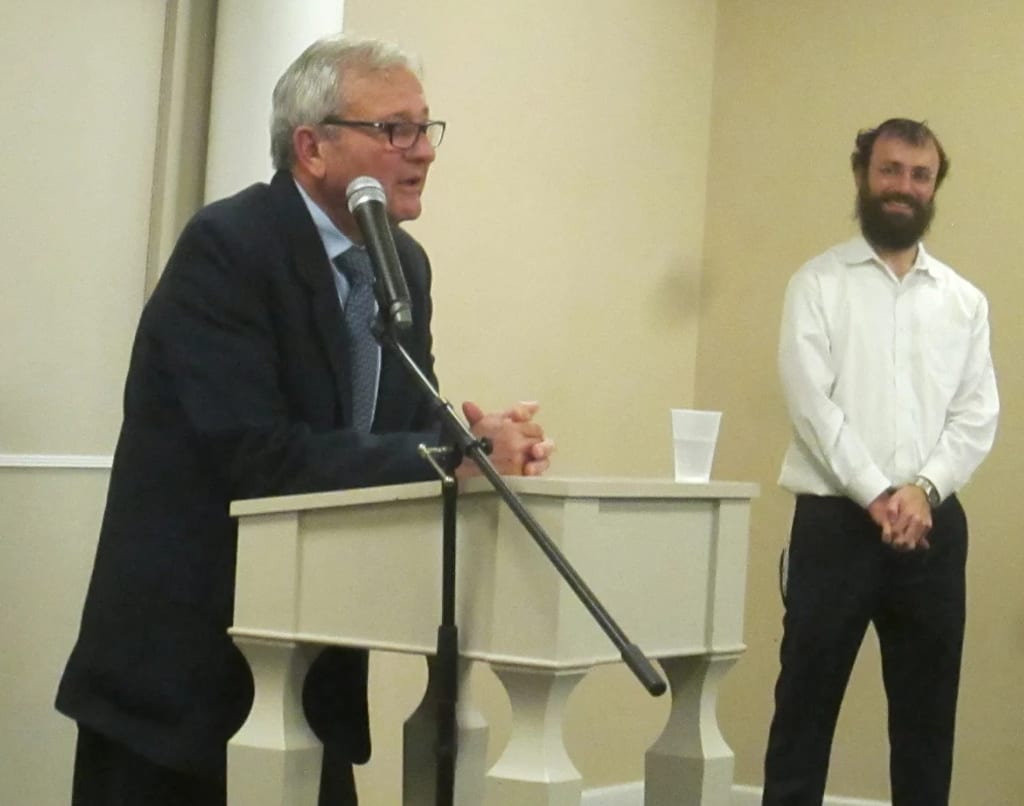Israeli Survivor of Munich Olympics Shares Story
Dan Alon rivets audience at Chabad of Bedford Hills.

Recently at Chabad of Bedford Hills, Dan Alon recounted his ordeal as an Israeli athlete at the 1972 Olympic Games, and the pain he kept silent for the next 35 years. But the tragedy that took the lives of 11 fellow Olympians had a simple message that endures for all Jews, and anyone who values humanity.
"The opening ceremonies were the first time any Jewish delegation was in Germany since World War II. I stood so proud to show them - and the world – here we are again," Alon asserted the sentiment of survival that hung over his presentation.
The pride that would be so abruptly dashed also traced back to his family history. His father was a champion fencer, but Israel was not yet recognized in 1948. So the Olympic dream was a family one. "I was born already with a sword in my hand," beamed the Tel Aviv native.
Alon went on to become the junior national champion in 1964 and held the national championship for four years. Unfortunately, politics again put the Alon family on the outside. "The Six Day War led to the broken international relations, and Israel was not eligible in 1968," said the 71 year old.
The Ordeal Begins
With 22 years of waiting, the family aspiration was on course. That is until machine gun fire did more than rouse him from his sleep. "Bullets went through the wall above my bed," he revealed.
Ultimately, he was spared of odds that were far less than even. “The terrorist walked past apartment two, where I was and took apartments one and three,” said Alon.
Soon after, Wrestling Coach Moshe Weinberg was shot in the face fighting back and bled out for nine hours later. "They dumped his body on the sidewalk," he said.
Weightlifter Yossef Romano was also killed after resisting. "Jewish blood was again spilled on German soil," he lamented.
This left the four athletes in the second apartment with three options. Having a rifle, they could shoot the one visible terrorist, try to escape or wait for help.
Initially, they opted to open fire but pragmatics overruled emotion. “Then what would happen. They might kill the hostages and then us,” Alon recalled the doubts.
Ruling out staying put, they took flight down a creaky set of wooden stairs. "They made so much noise that it took 20 minutes to go down 15 steps," he said.
The first escapee was able run across the adjoining garden without a problem, but Alon’s footwork as a fencer didn’t give him an advantage. "I tripped and fell," said Alon.
Escape
Before continuing, Alon was compelled to look back and found a Palestinian sniper looking right at him. "He didn’t fire," he said, riveting the audience.
Alon speculated that gunfire might have brought in the German Police so the marksmen deferred. Nonetheless, he saw no reason to celebrate. "I knew I’d never see them again," he said of the nine remaining hostages.
More than a hunch, he overheard the German position. "They were not going to let the terrorists leave the country alive," Alon conveyed.
Terrorists and hostages taking off on three helicopters, German police thought their ambush at the airport killed all the terrorists. "They counted five, but there were eight," said Alon.
The remaining three shot the hostages on the second helicopter and they weren't done yet. They used their grenades to blow themselves up with the remaining hostages on the third craft.
The next day the Israeli team returned home. Sadness was the only thing in the air. "It was so quiet, thousands of people and the wind," he said of the airport scene.
Escaping the Pain
Asked by an audience member what he did in those first months, he didn’t hold back. "I cried," Alon said.
Unfortunately, there was no avenue to release his anger. "I was angry at the Palestinians for committing violence, the German authorities who didn’t save our athletes, and the Israeli Olympic Committee that didn't provide security," he said.
Nonetheless, the fencer kept silent for 34 years. But building a successful business and raising a family helped served as therapy. He would finally relent when a Rabbi in England convinced him to open up. "He asked me to tell my story to his children," said Alon.
We are Still Alive
He continues to speak and is proud of his book, Munich Memoir: Dan Alon's Untold Story of Survival. The last page is especially memorable.
In Germany to speak, he ended up with his limo driver at the Brandenburg Gate, where the Memorial to the Murdered Jews is. There the unlikely duo danced and sang to the Israeli solidarity song "Am Yisrael Chai." "We could feel the six million dancing as angels with us," he conveyed the book's end. "The message was the same. We are here again. We are still alive."
Afterwards Sylvie Binder, who is on the Junior National Olympic Fencing Team, drew inspiration from his story. "The adversity he faced, he gives me a reality check of the many opportunities I have," said the Byram Hills High School Junior. "He is a great representative for the Jewish community." In truth, for all communities…
About the Creator
Rich Monetti
I am, I write.






Comments
There are no comments for this story
Be the first to respond and start the conversation.